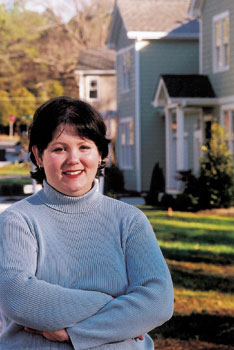

A publication of The Graduate School, University of North Carolina at Chapel Hill
Archives Fall 2002
Home | Back issues | About us | The Graduate School | UNC-Chapel Hill | Make a gift
White Picket Fences
 |
| Photo by Karen Tam |
| Shannon Van Zandt, in front of a Chapel Hill home for sale, looks at how housing opportunities improve quality of life. |
How homeownership changes
families' lives
Shannon
Van Zandt wanted to make a difference for communities in need of intervention.
So she switched from architecture to city and regional planning, as a
master’s student, because of its application to housing policy reform.
“Architecture is just
[about] the buildings, whereas planning deals with how people interact
with the built environment,” said Van Zandt, fourth-year doctoral
student and Lyle V. Jones Dissertation Fellow at Carolina. “When
I came to UNC, I got more interested in policy. I wanted to do something
that was important, that would help people.”
Van Zandt studies a national
homeownership program sponsored by the Neighborhood Reinvestment Corporation,
a congressionally chartered nonprofit corporation based in Washington,
D.C. A group of local-housing organizations, called NeighborWorks Network,
administers the program. Each organization offers homeownership counseling
to potential homeowners, low-interest first mortgages and gap financing.
Gap financing, provided through grants and second mortgages, helps fill
in between what families can afford to borrow and the cost of affordable
housing, Van Zandt explained.
“While the direct funds
are more critical for creating new home owners, the counseling helps families
to become better at handling their finances — budgeting and debt
management,” Van Zandt said. “Regardless of whether they become
home owners or not.”
Van Zandt specifically hopes
to measure the benefits of home ownership for lower-income families. Van
Zandt said she wants to know, “Are they able to move into neighborhoods
that give them better access to transportation and jobs?”
High-quality neighborhoods
could provide low-income homeowners with more opportunity for upward mobility,
because of increased access to education, employment, transportation and
higher resale value of housing, she said. Van Zandt looks at factors such
as wealth building, neighborhood quality and self-esteem and how each
of these areas is affected by home ownership.
“You really see a change
when you talk to low-income families who have become home owners,”
she says. “People have pride in their homes and communities.”
Besides working on a dissertation,
Van Zandt juggles teaching, marriage and baby Matthew. The Lyle Jones
fellowship has “been immensely helpful” in allowing her to focus
on the dissertation, Van Zandt said.
Professor Bill Rohe, also director
of the Center for Urban and Regional Studies and Van Zandt’s adviser,
said work like hers contributes to the field of city and regional planning.
But more importantly, research projects like Van Zandt’s assist government
leaders in making public policy decisions, he said. As both teacher and
researcher, Van Zandt can realize her goal to make a difference in people’s
lives.
- Joseph Pardington
© 2002, The Graduate School, The University of
North Carolina at Chapel Hill
All text and images are property of The Graduate School
at the University of North Carolina-Chapel Hill. Contact Sandra Hoeflich
at shoeflic@email.unc.edu
to request permission for reproduction.